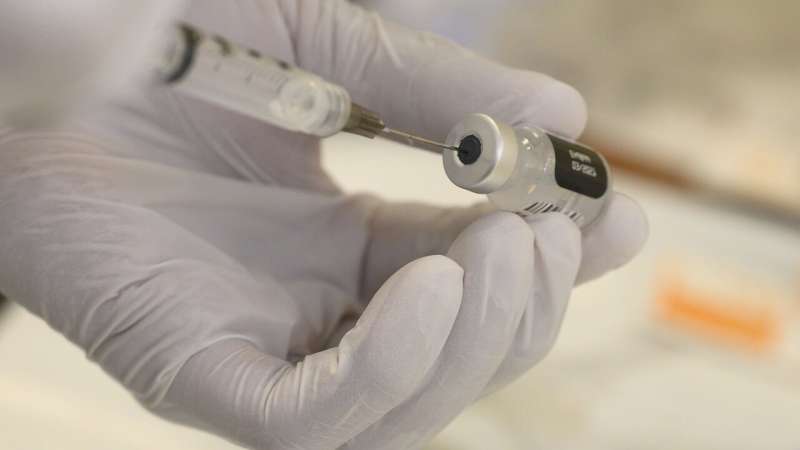This article has been reviewed according to Science X's editorial process and policies. Editors have highlighted the following attributes while ensuring the content's credibility:
fact-checked
peer-reviewed publication
trusted source
proofread
Study provides insights into impact of COVID-19 and vaccination on mother and child health

A study by KKH, Singapore General Hospital, National Center for Infectious Diseases and the Ministry of Health found that COVID-19 vaccination (mRNA-based COVID-19 vaccine) taken during pregnancy was associated with a reduced risk of COVID-19 infections among infants up to six months of age.
Maternal COVID-19 vaccination was found to be up to 44.4% effective in protecting infants against SARS-CoV-2 infection up to six months after birth. Protection was not found in infants whose mothers were vaccinated prior to their pregnancies. This is particularly important because to date, there is no available vaccine for vulnerable infants up to six months old.
Associate Professor Yung Chee Fu, senior author of the study, and Senior Consultant, Infectious Disease Service, Department of Pediatrics, KKH said, "Maternal COVID-19 vaccination remains the most effective way to protect mothers, their pregnancies as well as their newborns after delivery against severe outcomes from SARS-CoV-2 infection." The research is published in the journal JAMA Network Open.
"This study reinforces the importance of receiving boosters and keeping up to date with the recommended vaccination doses during pregnancy. Pregnant mothers cannot rely on the COVID-19 vaccines they received before pregnancy for protection of their newborns."
This study was conducted between 1 January 2022 and 31 March 2023, a period dominated by the omicron variants. It involved 7,292 infants who were categorized into three main groups: infants born to mothers who were unvaccinated, infants born to mothers who were vaccinated before pregnancy and infants born to mothers who were vaccinated during pregnancy.
Some additional findings include:
- Maternal COVID-19 vaccination during pregnancy remained effective in protecting infants against omicron XBB variants (the estimated vaccine effectiveness of third dose (booster) was 76.7 percent)
- There was no significant correlation between vaccination effectiveness and the timing during which the vaccination was administered during pregnancy.
Assoc Prof Yung added, "Our study plugs the gap on real-world effectiveness data on maternal COVID-19 vaccination against the omicron XBB variant. More importantly, it will help pregnant women make informed vaccination decisions regarding protecting their babies against COVID-19 infections."
Study on children and youths under 18 years
- One in six developed long COVID.
- Nasal congestion, persistent cough and fatigue were the most common long COVID symptoms.
- Screening for persistent symptoms is important, to address symptoms and assess for other causes.
The KKH study found that 16.8% or one in six children and youths under the age of 18 developed long COVID after an acute COVID-19 infection. For this group, one or more symptoms persisted beyond three months post-infection, and about half recover by six months.
The most common long COVID symptoms were nasal congestion or runny nose (7.6%), persistent cough (7.4%) and fatigue (3.0%).
It was also found that for children under the age of 18 who were infected with COVID-19, males were about 70% more likely to have long COVID compared to females.
Dr. Li Jiahui, Lead Author of the study, and Head of Infectious Disease Service, Department of Pediatrics, KKH said, "Studies have shown that severe symptoms during acute COVID-19 infection pose a risk factor for long COVID. Vaccination reduces the risk of severe COVID-19 infection and can potentially confer some protection against long COVID in children and youths. Keeping up with the COVID-19 and influenza vaccinations remain important in guarding our health and well-being.
"Given the prevalence of long COVID, it is important for physicians to screen for persisting symptoms in children and youths who had the COVID-19 infection so that we can address these symptoms and assess if there are other causes."
The study was conducted between 14 October 2022 and 15 January 2023, and is one of the first studies in Asia on long COVID in children and youths, and is the largest, involving 640 participants.
As Singapore is in a new normal, with COVID-19 treated as an endemic infection, it is still important for our vulnerable groups, including pregnant women, children, and adolescents to remain up-to-date with their vaccinations, including against influenza and COVID-19.
More information: Orlanda Goh et al, mRNA SARS-CoV-2 Vaccination Before vs During Pregnancy and Omicron Infection Among Infants, JAMA Network Open (2023). DOI: 10.1001/jamanetworkopen.2023.42475




















